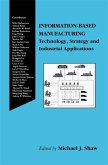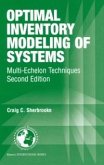The new edition of this successful textbook provides a comprehensive introduction to simulation, foregrounding the topic as an applied problem-solving tool. Guiding readers through the key stages in a simulation project in terms of both the technical requirements and the project management issues surrounding it, the book will enable students to develop appropriate valid conceptual models, perform simulation experiments, analyse the results and draw insightful conclusions. The author's engaging style and authoritative knowledge of the subject make the book as accessible as it is essential, drawing on case studies and complementary online content to encourage a critical engagement with the topic.
This is an ideal textbook for those studying on upper level undergraduate and postgraduate degree courses in business and management and MBA programmes, and is a core text for those specialising in operations management. In addition, it is an important text for students taking Simulation modules on engineering, computer science or mathematics degree programmes.
New to this Edition:
- A practical step-by-step guide to preparing a simple model
- Improved cross referencing, navigation and design
- Updated referencing and the inclusion of select new case studies
- New material available via the companion website
- Key concepts, on-page glossary terms and relevant further reading lists for each chapter
This is an ideal textbook for those studying on upper level undergraduate and postgraduate degree courses in business and management and MBA programmes, and is a core text for those specialising in operations management. In addition, it is an important text for students taking Simulation modules on engineering, computer science or mathematics degree programmes.
New to this Edition:
- A practical step-by-step guide to preparing a simple model
- Improved cross referencing, navigation and design
- Updated referencing and the inclusion of select new case studies
- New material available via the companion website
- Key concepts, on-page glossary terms and relevant further reading lists for each chapter









